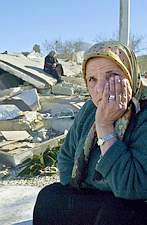

Homes Destroyed in Israel and Palestine
Israel Ends Some Home Demolitions
In an attempt to improve its image, Israel halts one home demolition policy, but will continue to demolish hundreds of Palestinian homes under other justifications.
|
|
Defense Minister Shaul Mofaz on Thursday evening adopted the recommendation made by a military committee to end the policy of demolishing houses belonging to terrorists’ families.
A military committee appointed by Israel Defense Forces Chief of Staff Moshe Ya’alon to examine the policy of house demolitions has recommended stopping them. The interim conclusions of the committee were presented last week to Ya’alon, who asked for some more information for the final draft.
Mofaz ruled that he will also put on hold the army’s prerogative to use home demolitions as a warning to terrorists. He said, however, that should circumstances change dramatically, it is possible that Israel would reconsider its policy on house demolitions.
The committee was headed by Major General Udi Shani, of the General Staff. The chief of staff asked the committee to find out if the demolition of the homes of families that include a terrorist, especially suicide bombers, was achieving its goal of deterring other Palestinians from getting involved in terror activity.
Shani reached the conclusion that no effective deterrence was proven, except in a few cases, and that the damage to Israel caused by the demolitions was greater than the benefits because the deterrence, limited if at all, paled in comparison to the hatred and hostility toward Israel that the demolitions provoked among the Palestinians.
In the period when the policy was applied, from the summer of 2002 to last summer, the army demolished 270 homes of families of terrorists, mostly in the West Bank. The house demolitions continued until recently. However, the Shani committee deals with a broader policy – and has reservations about demolishing houses if the violence resumes in the territories. Shani did not deal with the demolition of homes in Gaza, which were meant to reduce the threat to IDF outposts and roads used by Israelis, by creating empty areas between the Palestinian neighborhoods and the potential targets.
The house demolition policy has been controversial from the start. The IDF often presented cases in which family members turned in their sons before they went on an attack, explaining that they worried their house would be demolished if their son went on a terrorist attack. However, it turns out there were no more than 20 such cases during the entire intifada.
Amnesty International on Thursday praised Israel’s decision, but said the change did not go far enough.
“Any house that doesn’t get demolished is good news,” said Donatella Rovera, the human rights group’s researcher on Israel and the Palestinian territories.
“Of course, the overall number of houses that have been demolished in the last four years is in excess of 4,000, and out of those the category announced today was a fairly small category,” she said.
A senior officer who supports the house demolition policy told Haaretz that he thinks it was effective – as long as the houses involved belonged to suicide bombers and those who send them and the punishment is not extended to include those involved in shooting incidents or less serious crimes, as happened sometimes.
On the other hand, an internal army study published at the end of 2003 summing up the first 1,000 days of the conflict, said that “as of today, there is no proof of the deterrent influence of the house demolitions.” The number of attacks, said the report, even rose after the army began demolishing houses.
Maj. Gen. (res.) Yitzhak Eitan, who was in charge of the Central Command for the first two years of the intifada, said a few months ago that the house demolitions had the opposite effect than what Israel expected. He said the policy turned into an incentive for attacks motivated by vengeance.
Ya’alon lately appointed Maj. Gen. (res.) Ze’ev Livne to investigate house demolitions in Khan Yunis during an operation four months ago. Twenty-five homes were demolished, without the necessary approval of the General Staff and the Southern Command. Livne has not yet submitted his report.
| Videos |
| Additional Resources |
| Organizations |
| Stay Informed |
|
Sign up for our mailing list and receive an email whenever we post a new article on our news site, Israel-Palestine News. |
If Americans Knew distributes and posts to our website copyrighted material, sometimes without the permission of the copyright owner. We are making such material available in our efforts to advance understanding of the Israel/Palestine conflict. We believe this constitutes a ‘fair use’ of any such copyrighted material as provided for in section 107 of the US Copyright Law since it is being distributed without profit for purely educational purposes. For more information go to: http://www.law.cornell.edu/uscode/17/107.shtml. If you wish to use copyrighted material from this site for purposes of your own that go beyond ‘fair use’, you must obtain permission from the copyright owner.
This website is printer-friendly. Please Print this article and share it with your friends and family.


